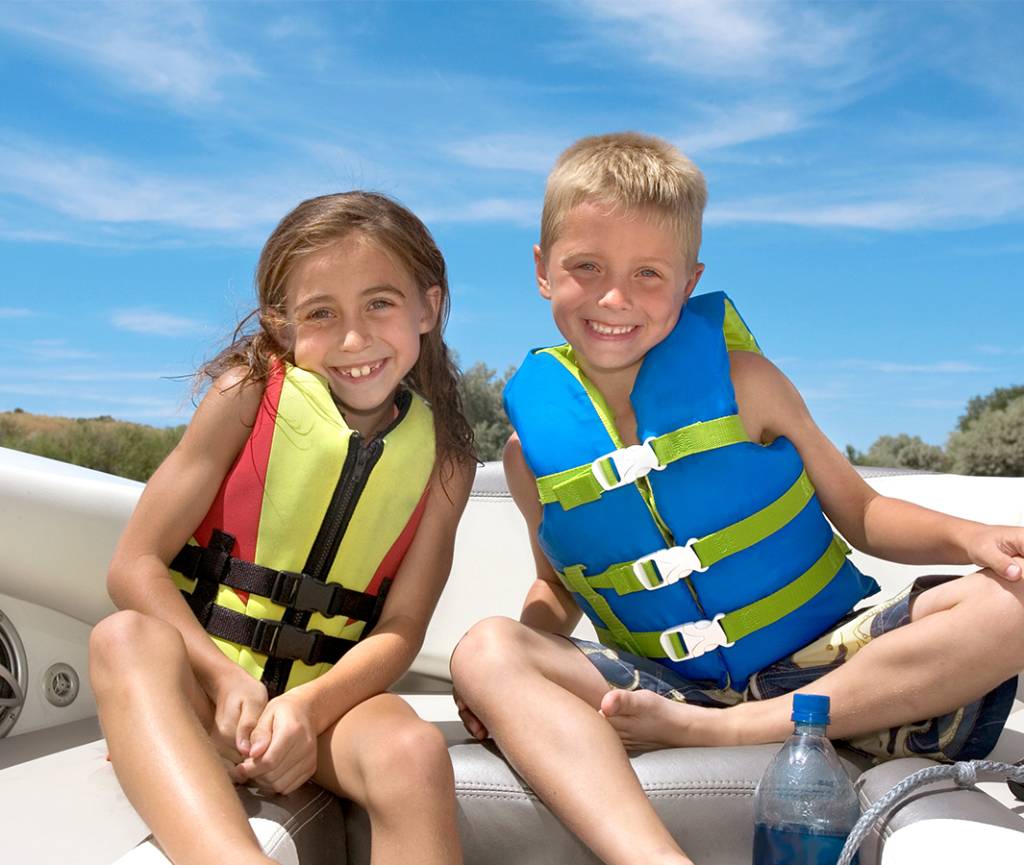
Going out on a boat is a favorite summer pastime. There’s nothing like being on open water, feeling the sunshine, and enjoying boat life with a refreshing breeze flowing around. But before you head out on the boat alone or with others, make sure you know how to boat safely to avoid any accidents or troubles while on the water.
1. Learn the ropes of operating a boat in New Hampshire
What may seem like the most obvious tip isn’t always one that boat owners do from the beginning – learn the ins and outs of boating and operating a boat. Many people grew up boating on the lakes and waterways of New Hampshire so when they take over boating for themselves they may assume they know all the rules and how to operate a boat or watercraft safely. To operate a boat or watercraft in the state of New Hampshire requires a New Hampshire boating license.
Everyone over 16 years old in New Hampshire needs a boating license if they are operating a boat over 25 horsepower
Since boating is more than knowing how to steer, shift gears, slow down or dock the boat, a required boating class offers excellent tips and teaches safety techniques and waterway laws. And of course, before you hit the water, you’ll want to make sure you know how to operate your specific boat model.
2. Check once and then check again
Before heading out for a boating excursion in New Hampshire check to make sure your boat is in good working order. Start the boat and listen for any strange sounds or noises that are louder than normal, find out what’s causing it before launching the boat into the water. Double-check that all safety measures are on the boat and easily accessible – life jackets, fire extinguishers, and emergency supplies. Becoming stranded on the water is very serious. It can often be hard to make it to shore and cell phone reception may be limited. An emergency whistle or horn is required by law when out on the water and will come in handy if you are broken down or require help.
Here are some items to check before you go out on the water:
-
- Check oil levels and filter
- Check transom mounting bolts (if equipped)
- Check propeller for damage
- Check air intakes for blockages
- Check oil pressure and engine operating temperature
- Check fuel levels
- Check battery power
- Check the steering system for looseness or extra play
- Check for hull damage
- Make sure you have proper documentation onboard including registration, inspection, and boating licenses
- Make sure the bilge pump is operating properly
- Make sure you have safety gear and first-aid kit onboard
- Make sure your fire extinguisher or fire extinguishing system is in working order
For more information, BoatUS.com has a comprehensive boat maintenance and safety checklist.
3. Weather in New Hampshire can change quickly – check weather conditions and forecast before you head out
Weather can have a significant impact on water conditions – so make sure to check the weather before leaving the dock. If the forecast calls for strong winds, rain or storms, it’s best to stay off the water. All of these factors can make a boating experience dangerous.
4. Bring and wear life jackets
Wearing a life jacket is often the difference between life and death. The state of New Hampshire requires children under a certain age to wear a life jacket while on any type of boat, and recommends every boater wears a life jacket. In addition to the life jacket requirement make sure all life jackets are in good condition, are the proper size and fit for the individual, and are readily accessible.
There are an estimated 3,960 drowing deaths in the the U.S. every year including boating-related drownings
Activities such as wakeboarding or tubing are also activities where wearing a life jacket is essential. That’s because these activities are done at high speeds and can cause injury. Even if you’re planning a casual, quiet float on the water, make sure you have a life jacket for each person on board. Weather and water conditions can change quickly.
5. Don’t drink and drive a boat
Drinking while driving a boat is not only against the law; it is also extremely dangerous. So dangerous, in fact, that the U.S. has passed a federal law against Boating Under the Influence (BUI).
Drugs and alcohol significantly affect motor skills, judgment and reaction time – none of these should be impaired when operating a boat.
Boating under the influence can lead to deadly accidents, expensive fines, and even jail time. The U.S. Coast Guard states that drinking while driving is even more dangerous on the water than on land.
6. New Hampshire boat operators must stay alert and check their surroundings
Enjoying the view of the beautiful water and surrounding area makes boating a great experience. But, while it’s wonderful to enjoy the view, staying aware of your surroundings and what’s in the water is critical.
You should always keep an eye out for debris in the water, other boats coming too close, people on skies or tubes and other motorized watercraft like jet skis. Remember that motorized boats and watercraft must give the right away to sailboats, canoes, kayaks, and other non-motorized vessels on the water.
7. Don’t leave any passenger behind
Boating can have a lot of distractions – friends and family conversations, music and the noise from other boats. Always be sure to check that your party is all safely aboard before pulling away from the dock. When taking part in water sports like tubing, swimming, and wakeboarding, make sure everyone in the water returns to your boat before you leave.
8. Understand the ways of the water on New Hampshire lakes and waterways
Just like on land, there are rules to maneuvering in the water with other boats. Before pulling away from the dock, make sure you know which direction you are required to leave from the dock. It’s important to know which boat has the right of way, where you can and can’t stop, the speed in the wake zone, and more. Understanding the rules of water will keep you and others safe. Spar Buoys are common markers on New Hampshire lakes. Here is a guide on how to use them for proper navigation.
- ALL RED: Marks a well-defined channel. Go between it and its companion the ALL BLACK Spar Buoy.
- WHITE with RED TOP: If heading East or West, go south of this buoy. If heading North or South, go West of this buoy.
- WHITE with BLACK TOP: If heading West or East, go North of the buoy. If heading North or South, go East of this buoy.
- Look for other markers such as NO WAKE ZONE, SWIMMING ZONE, and HAZARDOUS AREAS
9. Put together safety and tool kits
Be prepared for any event before taking off in the boat. There should be a safety kit on board, along with a tool kit. US Coast Guard-approved safety kits can be purchased at marine stores online. Make sure it includes items like a flashlight, bucket, and duct tape. Know who to call in case of an emergency.
Required safety items include life jackets or personal floatation devices, a throwable floatation device, a sound signaling device, a visual signal device, and a fire extinguisher. Other recommended items include:
- A first-aid kit
- Anchor
- Bailing device
- Oars or paddles if the engine quits
- Fully charged cell phone or VHS radio
- Flashlight
- Knife to cut away line tangled around a propeller
For an interactive graphic illustrating some of the risks associated with boating check out our Clickable Coverage graphic.
10. Know where you are
Make sure you know where you are and how to get back to your original destination at all times. Getting lost is no fun – but even if you do get lost, you need to be able to tell others where to find you.
11. Power off the engine before entering the water
Before entering, exiting, or swimming near the boat, the engines should always be off. Once the engines are off, the motor and fast-moving propellers stop working and won’t be able to injure anyone who accidentally gets near these parts.
12. Follow the rules
The driver or owner of the boat should always set safety rules for their passengers. The rules are meant to be followed – so it’s important to enforce them while out on the water. Any passenger who doesn’t follow the safety rules should be asked to leave the boat to ensure the safety of others.
The memories you make boating with your family and friends can last a lifetime. While you’re working on getting your boat ready for the water, check in with your insurance professional. Finding the right protection for your boat can help bring peace of mind, knowing that your big investment is carefully insured.
Owning a boat is a lot of fun and a great way to make amazing memories with family and friends. To learn more about how to protect your boating investment and protect your financial security read out our article titled Boating Insurance 101 – For NH and VT Boaters. To find out more about boat insurance and to discuss your specific needs fill out the form or call 800-392-6532 to speak with an agent.
This content is for informational purposes only and not for the purpose of providing professional, financial, medical or legal advice. You should contact your licensed professional to obtain advice with respect to any particular issue or problem.
Copyright © 2022 Applied Systems, Inc. All rights reserved.

